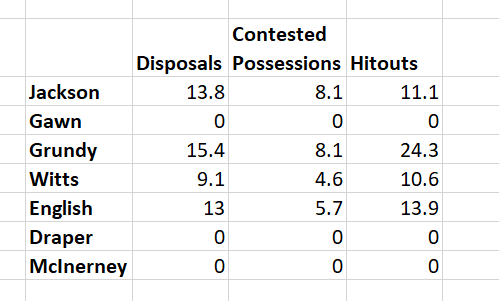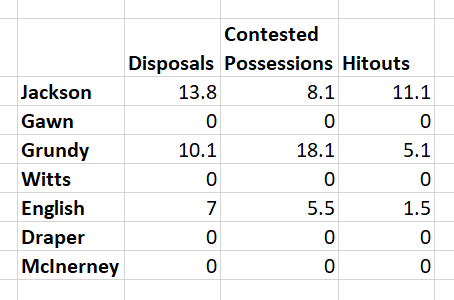Everything posted by Axis of Bob
-
Isaac Keeler
I'll be happy for Isaac Keeler! 😁
-
Isaac Keeler
I have only seen a few games of his (plus the highlights) so I have some knowledge but certainly not enough to be an expert at all - which is a caveat to the opinions I have on this year’s draft class. This is intended to not try to deceive anyone and also give context to any opinions I have …. those opinions might even be wrong! 😁 Based on those caveats, I gave my opinion from what I’ve seen. It’s not a matter of his body shape, it’s a matter of his competitiveness in the contest. Jefferson is a constant aerial threat and, in aerial contests, very competitive, brave and composed despite his current size. That’s what you want from a big man in our system. I’m not sure Keeler has that willingness to fight in the contest, which is why I wouldn’t draft him. I’d rather draft a player that I thought had some chance of playing a role in our team. There are a few differences though. Jackson is super competitive around the ball and fights to win the ball or defend. He isn’t currently able to affect aerial contests much but it’s a skill thing rather than a mentality. Also the small man skills are very different ….. Jackson has small man skills the equivalent of a small man, not just ones that are ‘good for a big man’ like Keeler. Jackson also competes in the ruck. But, of course, maybe I’m wrong.
-
Isaac Keeler
I’ve only seen very little of this year’s draftees, but I don’t think I’d pick him with any selection and I would be shocked (given how Melbourne play footy) if he was on our list of potential draftees. As a big guy he has some good little guy skills …. but that isn’t the role we’d need him to play. We need big guys with good big guy skills, players who compete in the marking contest and compete in the ruck contest. He’s a small player stuck in a big player’s body. I’m sure someone could take a chance on him …. but it wouldn’t be me. Apparently not Adelaide either.
-
Welcome to Demonland Matthew Jefferson
You're ruling him out as a player based on 2 minutes of loosely brought together junior highlights?
- Five man interchange
-
Five man interchange
Could anyone please post where they found this speculation? AFAIK, there isn’t anything in it beyond the circular rumours of the internet.
-
Farewell Luke Jackson
Ok boomer.
- Trade and Free Agency rumours
-
Trade and Free Agency rumours
I asked if we were fast last year. You said that we were not a fast side, even if we looked fast at times. It's your criteria I'm asking for, as I asked if we were a fast team last year. Rather than waiting for your answer, I'll preempt it to save myself time. Speed is not just how many running bounces you take, or how you operate in open space. Just because we don't play the expansive game of Collingwood, it doesn't mean that we don't play fast football. We would be one of, if not the top, team for defensive speed. This means that we use our speed to make games less open and less free flowing. Why would we do this? Because we have Gawn, Oliver, Petracca, Viney, Brayshaw and a bunch of gun tall defenders. When we can force the team into contests we will probably win, so we use our fast players to use that speed defensively to shut down space and rebound before the opposition gets a chance to escape our defensive squeeze. Being a fast team isn't just about being Peter Matera down the wing, it can also be Kozzie, Spargo and ANB immediately running out to the far pocket after a turnover to prevent a switch kick.
-
Farewell Luke Jackson
At 21 years old (which Jackson only just turned), these are the averages of those players. Note that Grundy played mostly solo ruck, whilst Witts and English played only 7 games each that season (with English being pushed out by Tom Boyd and Jordan Roughead as the WB rucks). If we compare them with their age 20 years (which Jackson played 2022 as): English played 2 games and Grundy played 15.
- Trade and Free Agency rumours
-
Farewell Luke Jackson
Because they only have to have a better deal than Freo.
-
Port chasing Kozzy Pickett
- Port chasing Kozzy Pickett
Why would you care what Kane Cornes says about this? Port have said it was stupid, then Lamb said it was stupid. There's obviously nothing there. The SEN audience is less than 3% in Melbourne and doesn't exist elsewhere. The idea that we have to sign him up before Xmas to shut up Kane Cornes is laughable. Maybe some people just enjoy their beds being wet.- Trade and Free Agency rumours
- Trade and Free Agency rumours
- Farewell Brodie Grundy
100% If the Dees make you a pitch and you think it would be a great place to play your footy, we have a reputation among players and managers that we will make that deal happen quickly and painlessly. It makes it easy to decide to switch and easy to buy in to a club that demonstrates that it will act in your best interests.- Hawks racism allegations (merged thread)
I think there is difference between what we are thinking a panel could look like. I'm not suggesting it is made up entirely, or even a significant number, of those experts. Just that there be a member be present. I think it's important that there be a (minor) presence to give those affected faith in it. I think the example of a judge that you used might be a good one when considering potential misgivings the indigenous community might have.- Hawks racism allegations (merged thread)
How is the panel supposed to understand the issues and the perspectives if there are no indigenous people or football people on the panel? And how would either side accept the outcome if there's nobody on the panel that can understand their perspective? Independent doesn't have to be synonymous with ignorant (ie, the panel, not you).- Hawks racism allegations (merged thread)
It's the problem with the AFL's short term management of the various issues that have popped up. It's all very well and good to make an issue go away by managing the issue in the short term (Goodes, Adelaide camp, Lumumba, etc) or by providing platitudes that don't require follow though (indigenous round, Dreamtime, etc), but when you need something from those whose issues you have been managing away, that lack of trust means that there's no genuine relationship. The families have every right, now, to say to the AFL that "We've told our stories but we don't trust you to act in our best interests, so #$%^ off". This is not their issue anymore, it's the AFL's. It's up to the AFL to repair the relationship with the indigenous community through genuine actions in the best interests of the indigenous community, which would only make an impact (slowly) over the longer term. There will, however, still be many whose bridges the AFL cannot unburn.- Jack Bowes Salary Dump
I do find it really interesting the idea of overvaluing what you can see and undervaluing what you can't see. As soon as posters saw "pick 7 for a salary cap dump and Bowes", they nearly fell over themselves to sign up. The questions of 'how much salary, how much do we have available, how does this fit into our salary strategy/structure' never really pops up because nobody know any of those numbers. It's effectively 'get pick 7 and Bowes for nothing because salary just goes into a magic box and those boffins will sort it out'. Every bit of salary we take on is salary that we can't use to bring in a player that we may really need. And that is either this year or in future years, as we can bring salaries forward to create space in future years. In our situation, is spending nearly 7% of our salary cap for 2 years in the middle of our premiership window really worth pick 7 (minus change) and Jack Bowes?- Jordan De Goey
And I'd rather be paid a million dollars a year in my job ..... but my past actions and performances have suggested to my employer that doing that would be a terrible idea. It's the same with Collingwood and de Goey. I assume that de Goey is thinking that someone is desperate enough that they will pay him a contract without the behavioural clauses (probably St Kilda, if history is anything to go by) and then make Collingwood decide to match that contract (without the clauses) or let him go. The really interesting bit will be if Collingwood matches the contract or not.- Jordan De Goey
The perceived injustices meted out to Jordan de Goey is a strange hill to die on.- Trade and Free Agency rumours
Averaged 0.82 tackles a game this year. That ranked him 555th out of 571 players this year for tackling. Of those who averaged fewer tackles, he's the only one to have played more than 6 games and be under 190cm. The only semi-regular non-key position/ruck that tackled less than him was noted defensive hard man, Riley Bonner. I reckon that's got a fair bit to do with his non-selection in the second half of the year.- Hawks racism allegations (merged thread)
This is the comment that you originally took umbrage with. rpfc did not say that the outcome could not be fair. He merely said that having a panel made up entirely of white ex-cops was not the best idea. It's entirely possible that you assumed that he was meaning what you thought he meant but it's also entirely reasonable that he didn't mean it that way. But there is also no doubt that having a panel made up entirely of white ex-cops is not the best idea. - Port chasing Kozzy Pickett






